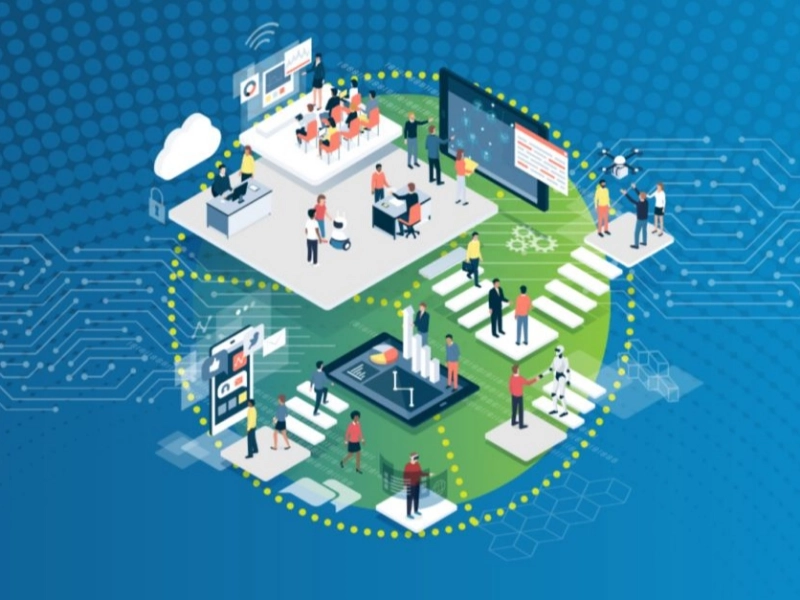How Online Degrees Are Shaping the Future Workforce
The structure of online degree programs is usually identical to that of traditional on-campus courses. Students participate in synchronous or asynchronous virtual classes and communicate with teachers and other students via message boards or email. For additional financial assistance to cover the costs of an online degree program, students can apply for grants, scholarships, fellowships, and student loans.
1. Increased employment opportunities

2. Greater Income
 Students can pursue education through online degrees without having to give up their jobs or family responsibilities. Many students who enroll in online programs may also be eligible for grants and scholarships, as well as other forms of financial assistance.
A college degree considerably raises your income potential, according to McKinsey research. Someone with a bachelor's degree makes 84% more money in their lifetime than someone with just a high school education.
As long as the degree is from a recognized university, the majority of companies view an online degree as a valuable credential, despite the fact that some may doubt its validity. In fact, during the COVID-19 pandemic, companies gave online learning more legitimacy. In actuality, companies are more interested in a candidate's skills than in their educational background. For this reason, it's critical that students choose a curriculum that aligns with their professional objectives and aspirations.
Students can pursue education through online degrees without having to give up their jobs or family responsibilities. Many students who enroll in online programs may also be eligible for grants and scholarships, as well as other forms of financial assistance.
A college degree considerably raises your income potential, according to McKinsey research. Someone with a bachelor's degree makes 84% more money in their lifetime than someone with just a high school education.
As long as the degree is from a recognized university, the majority of companies view an online degree as a valuable credential, despite the fact that some may doubt its validity. In fact, during the COVID-19 pandemic, companies gave online learning more legitimacy. In actuality, companies are more interested in a candidate's skills than in their educational background. For this reason, it's critical that students choose a curriculum that aligns with their professional objectives and aspirations.
3. Increasing contentment
 No matter what their job title or professional path, workers want recognition and a sense of purpose in their work. An employee will be more engaged and productive if they are happier at their job.
With the flexibility and structure that online degrees provide, students can study both the knowledge they will use in the industry and the technical skills required for their future careers. This allows students to practice time management, a trait that businesses value in potential hires, while simultaneously developing the skills required for professional success.
Employers are beginning to recognize online degrees on par with traditional degrees, despite their long-standing distrust. This is the result of evolving educational techniques and technological e-learning trends. Nowadays, employers are more interested in a candidate's qualities and capabilities than in their educational background.
No matter what their job title or professional path, workers want recognition and a sense of purpose in their work. An employee will be more engaged and productive if they are happier at their job.
With the flexibility and structure that online degrees provide, students can study both the knowledge they will use in the industry and the technical skills required for their future careers. This allows students to practice time management, a trait that businesses value in potential hires, while simultaneously developing the skills required for professional success.
Employers are beginning to recognize online degrees on par with traditional degrees, despite their long-standing distrust. This is the result of evolving educational techniques and technological e-learning trends. Nowadays, employers are more interested in a candidate's qualities and capabilities than in their educational background.
4. A more favorable work-life ratio
 A sound work-life balance is essential for both individual and professional well-being. Excessive levels of stress at work have been linked in studies to musculoskeletal ailments and heart disease.
Because online learning is flexible, students can complete their degree without worrying about their employment, family, or home life. This may also help to lower the housing and transportation costs associated with traditional degrees.
Through social engagement activities, online students can still form friendships with their peers and meet with instructors during virtual office hours. It is imperative to have this kind of support system in place if one wants to pursue a degree and lead a balanced existence. Additionally, it guarantees that students maintain their motivation and are able to turn in their assignments on time.
A sound work-life balance is essential for both individual and professional well-being. Excessive levels of stress at work have been linked in studies to musculoskeletal ailments and heart disease.
Because online learning is flexible, students can complete their degree without worrying about their employment, family, or home life. This may also help to lower the housing and transportation costs associated with traditional degrees.
Through social engagement activities, online students can still form friendships with their peers and meet with instructors during virtual office hours. It is imperative to have this kind of support system in place if one wants to pursue a degree and lead a balanced existence. Additionally, it guarantees that students maintain their motivation and are able to turn in their assignments on time.
5. Continued Professional Development
 Studies reveal that the quality of online learning is comparable to campus-based programs, despite some students' concerns that their degrees won't be as important as traditional degrees. Moreover, online degrees offer the chance to develop proficiencies and abilities that are highly sought-after across many sectors.
Professionals possessing these abilities can prosper and adjust to shifting employment marketplaces. Furthermore, earning an online degree shows potential employers that you can successfully balance work and personal obligations, which is a valuable skill for many job seekers.
Furthermore, online degrees provide networking opportunities through forums and virtual events, allowing people to connect with colleagues and industry experts, which can be extremely beneficial for their future jobs. In the end, more and more job pathways now include degrees from several sources, such as colleges, labor unions, companies, coding boot camps, and even cultural organizations.
Studies reveal that the quality of online learning is comparable to campus-based programs, despite some students' concerns that their degrees won't be as important as traditional degrees. Moreover, online degrees offer the chance to develop proficiencies and abilities that are highly sought-after across many sectors.
Professionals possessing these abilities can prosper and adjust to shifting employment marketplaces. Furthermore, earning an online degree shows potential employers that you can successfully balance work and personal obligations, which is a valuable skill for many job seekers.
Furthermore, online degrees provide networking opportunities through forums and virtual events, allowing people to connect with colleagues and industry experts, which can be extremely beneficial for their future jobs. In the end, more and more job pathways now include degrees from several sources, such as colleges, labor unions, companies, coding boot camps, and even cultural organizations.









